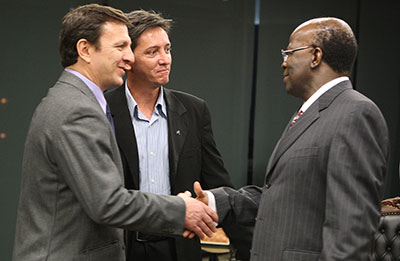“Leave me in peace. Wallow in your garbage,” Brazilian Chief Justice Joaquim Barbosa said in a rage when a reporter with one of the leading national newspapers, O Estado de Sao Paulo, tried to ask him a question Tuesday at a meeting of the National Council of Justice in Brasilia, the capital. Stunned by Barbosa’s reaction, the journalist demanded an explanation. “You are a clown,” was the response he received from the president of Brazil’s highest court.
Later that day, the court released a statement in which Barbosa, who is well known for his tough stand against political corruption, apologized for the eruption and said it was an isolated incident that didn’t reflect his relations with the press. The chief justice noted that he is committed to freedom of expression, as evidenced by initiatives like the dialogue he was to hold with CPJ the following day. Asked to comment on Barbosa’s unfortunate outburst, I told the paper, “The relations between democratic institutions and the press should be based in mutual respect.”
The next day, I met Barbosa at his elegant, solemn office in downtown Brasilia, together with leading investigative journalist and CPJ’s International Press Freedom Awardee Mauri König.
Barbosa showed interest in CPJ’s view of press freedom conditions in Brazil, and was well aware of recent deadly violence affecting provincial journalists. However, the chief justice said he didn’t think that judicial censorship–judges siding with powerful figures against the press in defamation or privacy cases–is a big issue in Brazil, despite research by local and international groups that show otherwise. I heard a similar opinion from one of his predecessors, Antonio Cesar Peluso, whom I met in 2010.
The meeting with Barbosa was part of a CPJ mission to the Brazilian capital to introduce Attacks on the Press to top officials in all three branches of government, express our concern about a spike in journalist murders, and discuss Brazil’s role in defending the regional human rights system. König, who is back in Brazil after a short period in exile following serious death threats for a report on police corruption, is a director at the Brazilian Association of Investigative Journalism or ABRAJI.
Before our appointment at the high court, we visited the federal Congress to meet with the top leaders of both chambers. Renan Calheiros, president of the Senate, stated the body’s full commitment to free expression and was emphatic in his support of the Inter-American human rights system, which is under attack by the ALBA bloc led by Ecuador. “Anything that damages the current hemispheric human rights system will encounter a barrier in the Brazilian national Senate,” Calheiros said. The president of the Chamber of Deputies Henrique Alves used a similar tone, saying he will seek a declaration of support from the Chamber.
Both Congressional leaders provided information on a project under consideration by the Chamber of Deputies that would give federal police jurisdiction to investigate crimes against journalists. The bill, according to news reports, is prompted by the difficulties and challenges faced by local police investigators to solve these crimes. However, a few prominent journalists have told CPJ the initiative is not inclusive enough (as it doesn’t comprise the constitutional right to freedom of expression), and could be interpreted by some as a privilege for journalists at a time when crime rates across the country are soaring. Calheiros and Alves, both powerful politicians that represent poorer northeastern states, have themselves survived various corruption investigations.
We met with Human Rights Minister Maria do Rosário, who also expressed support for the Inter-American Commission on Human Rights and its special rapporteur on freedom of expression. “Brazil is working hard together with other OAS [Organization of American States] countries to strengthen the regional human rights system, and preserve the autonomy and independence of the commission,” she said.
Do Rosário said her ministry is studying the creation of a federal mechanism for the protection of journalists at risk as a result of increased threats and journalists’ murders. She said a special group composed of human rights officials, the Justice and Communications ministries, the presidency, the federal police, and press groups (including ABRAJI), will create a monitoring system for attacks against the press. After a six-month evaluation period, the group will make recommendations whether or not to create a mechanism. If created, the program would replicate one currently in place since 2004 for the protection of human rights defenders. That program provides assistance, including relocation and police protection, for those who have received serious threats or feel under attack for their work.
Underscoring the need to protect journalists and prosecute their attackers, radio journalist Rodrigo Neto was gunned down today in Minas Gerais state–the ninth journalist murder in Brazil in the past two years.
CPJ’s high-level meetings this week were coordinated by ABRAJI director Fernando Rodrigues, prominent journalist with the leading daily Folha de Sao Paulo, and the group’s staff members. Widely respected among local reporters, ABRAJI was founded in 2002 and has made great strides in promoting investigative journalism throughout Brazil. The organization has trained and educated 4,000 journalists, and has a program that monitors press freedom violations.
